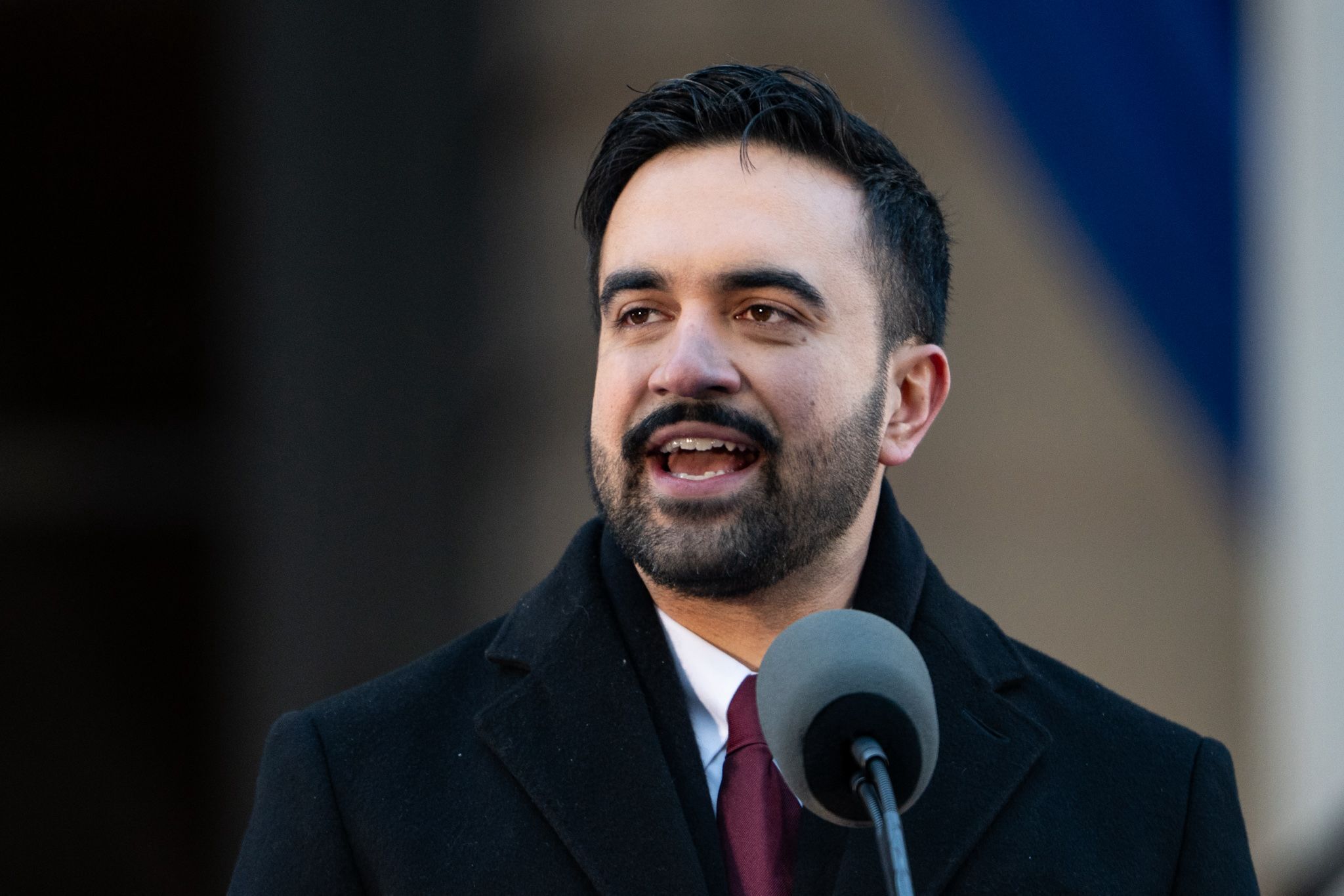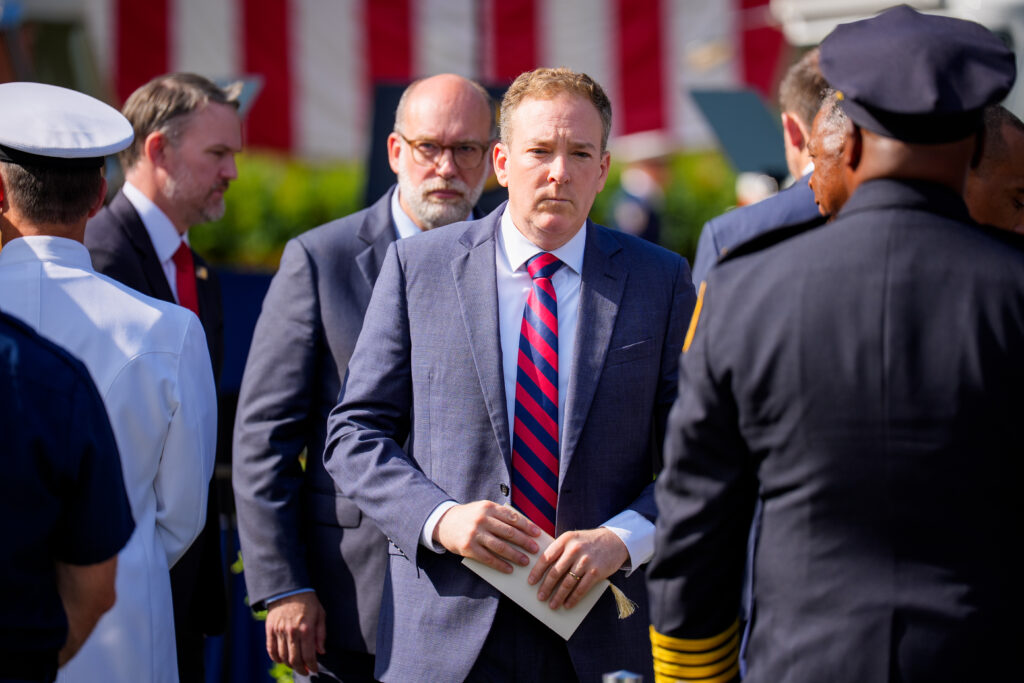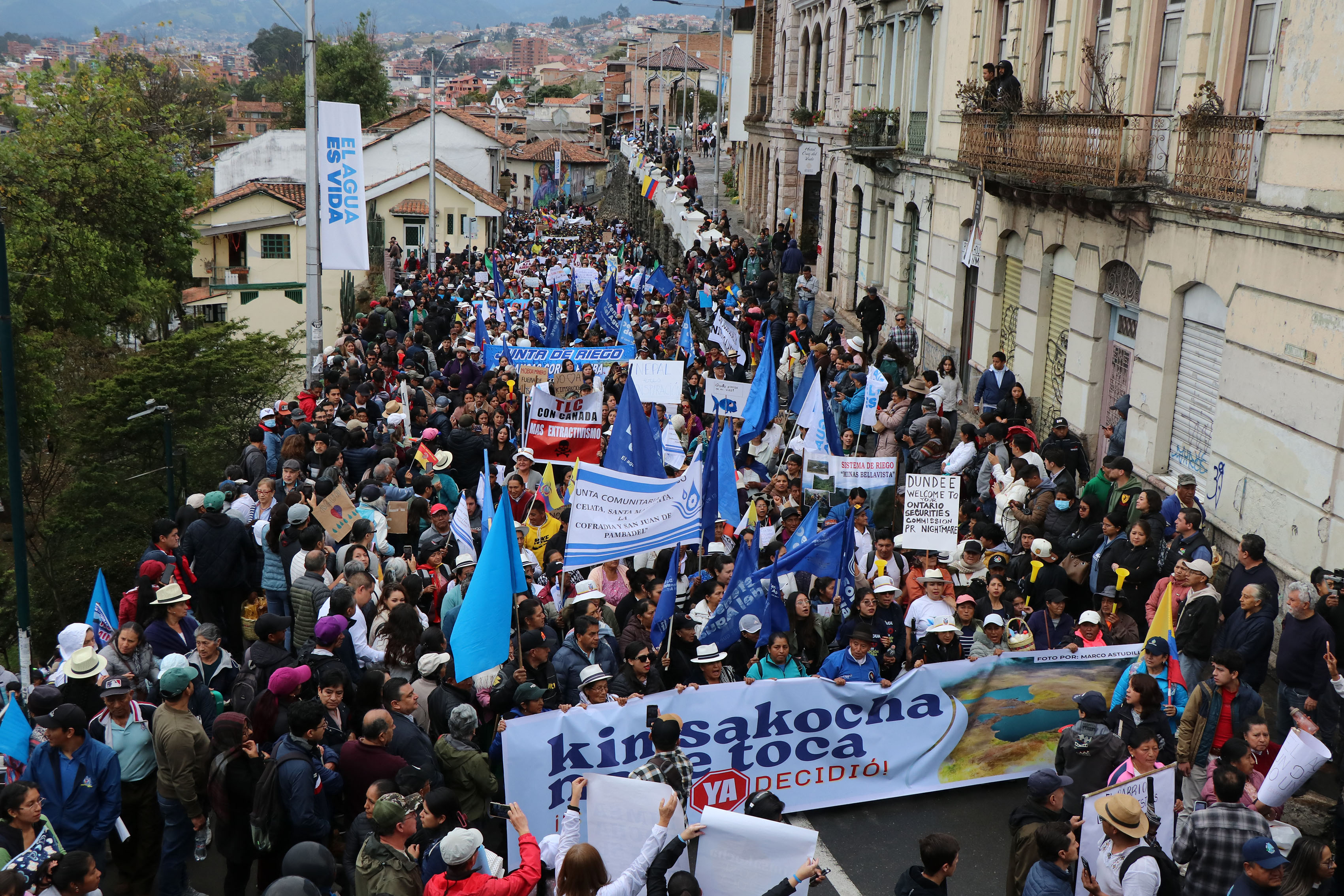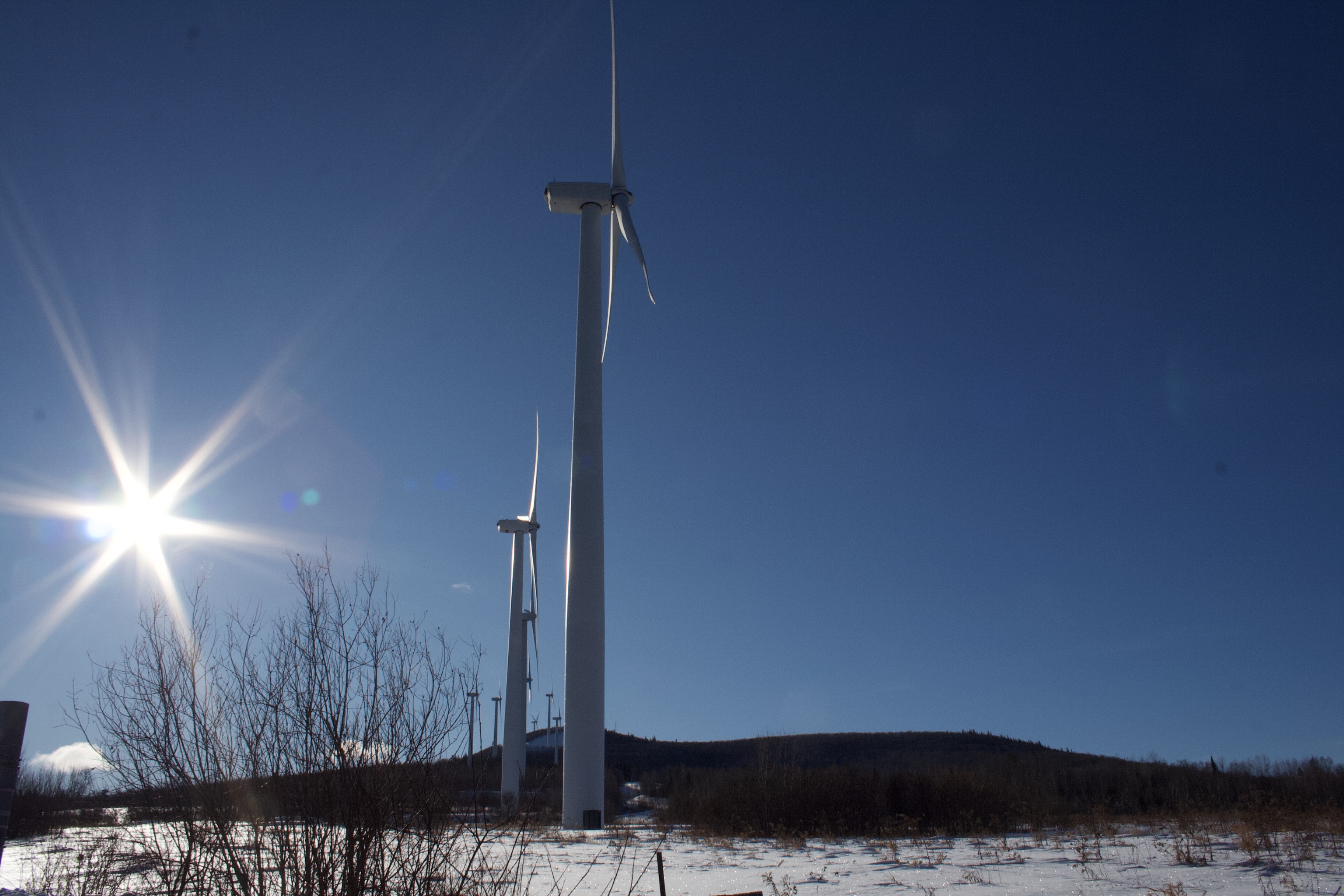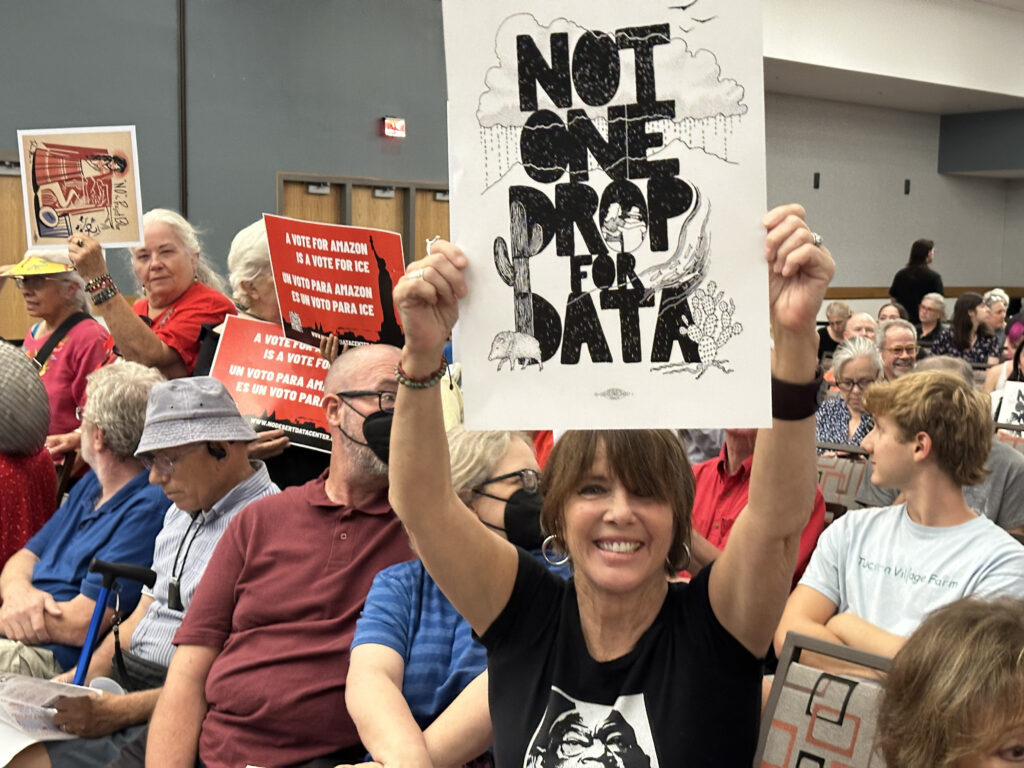Cashing Out: Eighth in a series on the secretive system disrupting climate action and forcing big payouts to fossil fuel companies.
In January 2000, thousands of Bolivians flooded into the streets of the city of Cochabamba. The region’s water services had just been privatized and sold to an American-led consortium, which hiked rates sharply.
The protests roiled the country for months and forced the national government to cancel the contract, returning water services to public control.
But after the consortium filed a legal claim against the Bolivian government in 2002, seeking up to $50 million, the popular uprising transformed into a broader fight against the legal system that allowed this. Investor-state dispute settlement, or ISDS, lets foreign companies bypass national courts and sue governments before international panels of arbitrators.
These tribunals have awarded hundreds of millions or even billions of dollars to companies, even in cases where they flouted national laws, polluted the environment or were accused of violating human rights. Most of these cases have been filed by companies from wealthy nations against developing countries, prompting critics to say ISDS acts like a form of modern-day colonialism.
Bolivia wanted out of the system. Within a few years, it started a movement that has spread around the globe.
From the United States to Europe, Colombia to Indonesia, governments are re-examining a cornerstone of international trade and investment that has held strong for decades. Many elected leaders, activists and legal experts from the political left and right have come to see ISDS as a threat to government policymaking and national sovereignty.
The system has also emerged as a hurdle for climate action: Australia, Canada, Germany, Italy, Slovenia, Spain, the Netherlands and the United States have collectively faced billions of dollars in claims prompted by policies to limit fossil fuels or promote renewable energy.
“ISDS is highly problematic, to put it mildly,” said Surya Deva, United Nations special rapporteur on the right to development. “An investor telling a government, ‘We will bring an arbitration case if you try to protect a local community or give them access to water or limit our mining operations,’ that is crippling.”

Yet even as opposition to ISDS has spread, the system is not going anywhere soon. In some cases, wealthy nations have started to eliminate foreign investor protections among themselves while insisting that poorer nations maintain them.
Many business groups and some academics continue to advocate for ISDS, saying it helps drive foreign investment, especially to small and politically unstable countries like Bolivia.
In these places, investor-state settlement protections serve as a guardrail, said Monica de Bolle, a senior fellow at the Peterson Institute for International Economics. Its presence, she said, sends a signal to prospective investors: “They have ISDS, so if something goes wrong, I’m protected.”
Research on this question has been notoriously inconsistent. Analyses of dozens of studies show no conclusive evidence that these protections increase investment.
Any nation seeking to extricate itself from investor-state arbitration faces an uphill battle: The protections are built into more than 2,600 treaties and countless contracts that would need to be renegotiated or canceled, a daunting task.
Bolivia spent more than a decade snipping the threads tying it to those legal agreements. And yet, it’s still not quite free.
“We Want Partners, Not Bosses”
Like many developing countries, Bolivia bound itself to ISDS in the 1980s and 1990s. The nation was emerging from a period of military dictatorship that had left debilitating debt and hyperinflation.


When the civilian government looked for help overseas, World Bank officials and other global financiers promoted a set of policies, known as the “Washington Consensus,” that included market-friendly reforms like privatization, deregulation and lower taxes. Investor-state arbitration, the officials said, would attract foreign investment, which in turn would lead to prosperity. Bolivia signed 22 investment treaties with ISDS clauses from 1987 to 2002.
The policies brought down inflation and stabilized the economy. But they did little to improve people’s standards of living or reduce inequality. For the majority of Bolivians still living on less than $2 a day, prosperity never came. It was those Bolivians’ formidable social movements that in 2005 propelled an outsider to the presidency who promised to “end the colonial state and the neoliberal model.”
Evo Morales, a former coca farmer who’d stood with water protestors in Cochabamba years earlier, pledged to renationalize natural resources and disentangle the country from Washington, D.C.
“We want partners, not bosses,” became his tagline. The government took control of oil and gas and other industries. On his 100th day in office, Morales led a military contingent to a gas field operated by a Brazilian-Spanish consortium in southern Bolivia to announce that foreign companies had six months to renegotiate their contracts. After he spoke, a soldier unfurled the red, yellow and green Bolivian flag from atop a processing plant.


In 2007, Bolivia withdrew from the treaty tying the country to the World Bank’s arbitration arm, the International Center for Settlement of Investment Disputes, which administers most ISDS claims.
The Washington-based center is the most prominent embodiment of the ISDS system, which Bolivia was intent on opposing for several reasons, said Pablo Solón, a former Morales trade adviser in charge of the withdrawal. Cases can only be initiated by transnational investors against states, and not the other way around. Proceedings are conducted behind closed doors despite having public consequences. And there is no binding code of ethics for arbitrators, who can act as both judges and counsel within the system.
But leaving that World Bank treaty was largely symbolic. It merely shut off one forum for arbitration disputes, albeit a well-known one seen as especially friendly to investors. Until Bolivia terminated the treaties with other nations, companies could continue to bring new claims using other forums, like ones administered in London and The Hague.
Bolivia began pulling out of those treaties in 2009, after enacting a new constitution banning ISDS. Still, there was a catch. Most of these agreements contain “sunset clauses,” which allow companies who invested before termination to bring new claims for five to 20 years afterward unless all parties to the treaties agree to abolish the provision. Nearly all of Bolivia’s treaty partners, including the United States, did not consent.


The last of Bolivia’s sunset clauses will end in 2035, according to U.N. data. So far, the nation has faced 19 publicly known claims, though former government officials and lawyers say another 10 or 20 have been filed in secret.
It took the government eight years after its 2007 withdrawal from the World Bank treaty to enact national legislation as a replacement for ISDS. The rules require disputes to be arbitrated in Bolivia and give Bolivian courts final say over awards.
For ISDS supporters, that is exactly the problem. Human Rights Watch has called the Bolivian judiciary “broken” and highlighted how Morales weakened judicial independence over his 14 years in office. The current president, Luis Arce, has pursued similar policies. Neither a Morales spokesperson nor the Bolivian embassy in Washington or its New York City consulate responded to requests for comment.
Eduardo Rodríguez Veltzé, who served as the president of Bolivia’s Supreme Court from 2004 to 2005, said in an interview at his home in June that past efforts to reform the country’s judiciary have been unsuccessful. He’s not optimistic that will change any time soon.
“Justice is a sad story in this country,” he said.


Yet just because a country’s justice system may be deficient, said Deva, the U.N. special rapporteur, that doesn’t mean foreign corporations should be given exclusive rights to bypass them.
“When people say that investors cannot trust the legal system, I say even communities might not trust the legal system of their own country either,” Deva said, adding that ISDS exacerbates what is already an imbalance of power between foreign companies and local communities.
That argument has attracted unlikely supporters, including Donald Trump’s former trade representative. In 2018, Robert Lighthizer told Congress that the U.S. government ought to be skeptical of ISDS and questioned why a foreign national should have more rights in America than an American.
“A U.S. person goes into a court system, goes through the system and they’re stuck with what they get,” he said. “A foreign national can do that and then at the end of the day say, ‘I want three guys in London to say we’re going to overrule the entire U.S. system.’”
The Unraveling
Bolivia’s pivot away from ISDS helped spark a wave of other withdrawals.
South Africa was already reviewing its investment treaties at the time. One claim had been filed in response to the nation’s post-apartheid policies to share mining wealth with Black citizens. The country’s leaders had signed ISDS treaties in the 1990s without realizing their scope, according to Randall Williams, a former legal advisor to the government. The investment treaties gave all the rights to foreign companies, he later wrote, while the government was given all the obligations.
“Obviously, if this were a personal contract, no one would sign it in their personal lives,” Williams wrote. “This then begs the question—why would officials enter into such agreements on behalf of their countries?”
South Africa sent a delegation to Bolivia to learn about its ISDS withdrawal, according to one person involved, and began withdrawing from its own investment treaties in 2013. At the same time, Ecuador, India, Indonesia, Venezuela and other nations were taking similar steps as a flurry of arbitration claims challenged governments’ regulations on tobacco packaging, oil and gas drilling, gambling and other matters of public health and safety.
Other countries opted to quietly let their treaties expire out of fear of being perceived as anti-investment, according to people who have studied and worked in the system. These moves began building a case against investor-state arbitration.
Yet withdrawal can be fragile. In 2021, Ecuador’s then-President Guillermo Lasso rejoined the World Bank treaty that helps administer arbitrations, though many experts have questioned whether that move violated a prohibition on ISDS written into the country’s 2008 constitution. The nation signed a free trade agreement with Costa Rica, only to have it struck down by Ecuador’s high court because of its inclusion of ISDS.
“Obviously, if this were a personal contract, no one would sign it in their personal lives. This then begs the question—why would officials enter into such agreements on behalf of their countries?”
— Randall Williams, a former legal advisor to South Africa
Last year, President Daniel Noboa placed a ballot question on a referendum that would have reversed that constitutional ban. Noboa was negotiating a new investment agreement with Canada, which was seeking to include investor-state arbitration, according to debates in the Canadian parliament.
Ecuadorians rejected the ballot measure by a wide margin.
As Ecuador, Bolivia and other countries have pulled out, other nations have instead sought to reform the system. Some countries have “new generation” treaties that include carve-outs meant to protect certain types of regulations from arbitration claims, for example.
It’s unclear whether these new agreements are having the intended effect, however. Colombia has faced three claims from Canadian companies following a ban on mining in a sensitive ecosystem, despite the environmental carve-out in its free trade agreement with Canada. Though the Colombian government prevailed on two of the three claims, its costs for the three suits totaled $11 million, which taxpayers will finance.
Earlier this year, the Colombian government announced that it will attempt to renegotiate its trade and investment agreements to remove ISDS, though doing so would require the cooperation of the other parties.
María Claudia Lacouture, executive president of the Colombian American Chamber of Commerce, whose members include major multinational corporations, warned against this move. In an email, Lacouture said investment protections help provide the certainty foreign businesses seek and that arbitration’s “separation from the national legal system enhances investor confidence by guaranteeing neutrality and predictability in the resolution process.”
Colombia has faced at least 23 ISDS claims in the past decade.
“Who Is Winning?”
One of the most puzzling questions about ISDS is why it still exists. Several wealthy nations that constructed it and are its biggest beneficiaries—the United States chief among them—have begun turning against it. For the countries more often on the losing end, activists and academics are pointing the way to the exits.
Opponents have campaigned against the system since the early 1990s, said David Gantz, an ISDS supporter and the Will Clayton fellow at Rice University’s Baker Institute for Public Policy. “And to put it very bluntly,” he said, “they’ve won.”
Many countries, including Spain and Italy, have reconsidered ISDS after damaging energy-related claims. In the United States, officials in both political parties now dislike it because of a view that it infringes on sovereignty, discourages governments from adopting regulations and hurts American workers.
“I think it’s gone,” Gantz said of ISDS. “Or it’s almost gone.”
Still, dismantling it could take decades.
“The system is designed to be as sticky as it gets,” said Josef Ostřanský, a policy adviser at the International Institute for Sustainable Investment who is critical of investor-state arbitration. “Super easy to get in, but it’s very difficult to get out.”
This story is funded by readers like you.
Our nonprofit newsroom provides award-winning climate coverage free of charge and advertising. We rely on donations from readers like you to keep going. Please donate now to support our work.
Donate Now
Some industry groups continue to promote investor-state arbitration protections; the American Petroleum Institute tried, with some success, to have it included in NAFTA’s replacement agreement.
Yet many experts say ISDS is rarely if ever the key factor for whether a foreign company invests in a country. A 2020 meta-analysis, published in the Journal of Economic Surveys, looked at 74 studies that examined this question and determined that the “effect of international investment agreements is so small as to be considered zero.” The authors left open the possibility of positive effects that studies weren’t able to capture.
Ecuador released an audit of its investment treaties in 2017 that concluded that its top sources of foreign investment came from countries it had no investment agreement with. An earlier study in South Africa came to similar conclusions. And Brazil, which never signed on to ISDS in the first place, has been a magnet for foreign investment.
While experts say foreign investment data for Bolivia is unreliable, U.N. figures suggest an increase after 2007, when the country withdrew from the World Bank treaty, and then a decline after 2013. But linking economic trends with ISDS is difficult because of the many variables involved. Bolivia’s rise and fall in foreign investment was tied most closely to commodity prices, said de Bolle, of the Peterson Institute for International Economics.
Still, de Bolle argued that given Bolivia’s small size and political upheavals, the lack of ISDS protections are part of the reason for the country’s recent economic struggles. “It is certainly contributing to the problems that they’re having,” she said.




Within the small world of academics and lawyers who study and work on ISDS, many say that its most vocal supporters are not investors but the law firms and lawyers who argue, arbitrate and profit off the cases. Whether a company wins or loses its claim, “you have to pay your lawyers and you have to pay the tribunal,” said J. Benton Heath, an associate professor at Temple University’s Beasley School of Law, who worked as an arbitration lawyer in private practice and an attorney-adviser at the U.S. Department of State until 2018. Those payments generally amount to millions of dollars for each claim, with arbitrators receiving up to $3,000 each day they work on cases.
“Who is winning?” Heath said. “The house always wins.”
Supporters like Gantz argue that the turn against ISDS could jeopardize the transition to cleaner energy. Even if ISDS is not a decisive factor in driving investment, he said, removing it would create one more roadblock to drawing the trillions of dollars needed to build renewable energy systems across the globe.
Ostřanský is working on a new model for international agreements to address this, one that would replace investor protections with mechanisms meant to encourage investments and the transfer of technology.
And companies have other options for operating in challenging markets. Foreign investors can purchase political-risk insurance to protect themselves, for instance.


Meanwhile, in El Alto, a bustling city on a plateau above Bolivia’s capital city La Paz, the country’s solicitor general is defending Bolivia’s last publicly known ISDS case. A Swiss insurance company filed the claim in 2020 over nationalization of the pension system.
In an interview earlier this year, Solicitor General César Adalid Siles Bazán called the nation’s ISDS exit an “intelligent decision.”
With the country’s independence from ISDS, foreign investors who think they’ve been wronged will have to take their chances in Bolivian courts, just like Bolivians.
About This Story
Perhaps you noticed: This story, like all the news we publish, is free to read. That’s because Inside Climate News is a 501c3 nonprofit organization. We do not charge a subscription fee, lock our news behind a paywall, or clutter our website with ads. We make our news on climate and the environment freely available to you and anyone who wants it.
That’s not all. We also share our news for free with scores of other media organizations around the country. Many of them can’t afford to do environmental journalism of their own. We’ve built bureaus from coast to coast to report local stories, collaborate with local newsrooms and co-publish articles so that this vital work is shared as widely as possible.
Two of us launched ICN in 2007. Six years later we earned a Pulitzer Prize for National Reporting, and now we run the oldest and largest dedicated climate newsroom in the nation. We tell the story in all its complexity. We hold polluters accountable. We expose environmental injustice. We debunk misinformation. We scrutinize solutions and inspire action.
Donations from readers like you fund every aspect of what we do. If you don’t already, will you support our ongoing work, our reporting on the biggest crisis facing our planet, and help us reach even more readers in more places?
Please take a moment to make a tax-deductible donation. Every one of them makes a difference.
Thank you,





